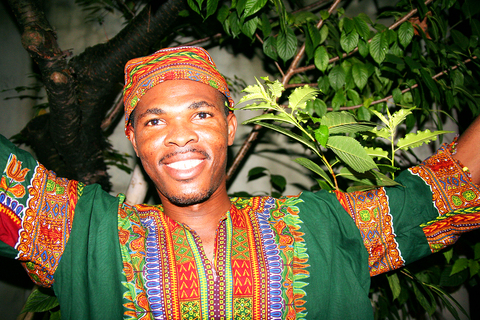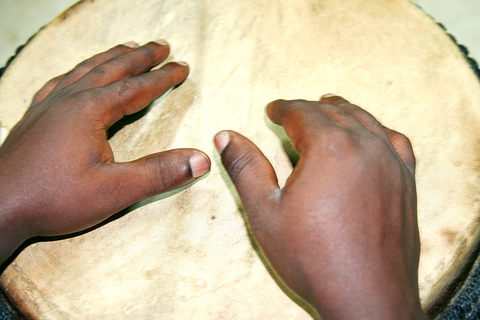It can be tough being black in Taiwan but Pan Africana Cultural Troupe aims to change that through the power of music.
The group has been banging the drum of African culture for four years, gigging at festivals, clubs, pubs, business functions and schools.
The seven band members play traditional African drums and songs, perform dances and acrobatics, as well as updating traditional music with rap, soca, reggae and dance hall sounds.

PHOTOS: JULES QUARTLY, TAIPEI TIMES
Tonight Pan Africana brings its message to Bliss, in Taipei. It's a message worth listening to.
“On the MRT or bus sometimes people don't want to sit by us, or hold their nose,” group founder Ben Stobite Sampson said. “It's difficult for people to get to know us because of what they've read or seen on the TV.”
“It's natural for people to be reserved to begin with, but after they listen to us and know us they will love us and we will come together as one.

“Chinese culture is traditional and strong so it can be hard to change people's minds. But generally, we have found Taiwanese to be kind and once they know who we are they are very friendly.”
Often enough, Sampson said, Westerners are the first to appreciate their music and dance. “They show the way and when locals see this they think it's OK and get involved themselves.”
Sampson is a thoughtful and enterprising man from Ghana, who saw the need for cultural understanding on his travels around Asia as an import-export businessman.
It was in Guangzhou (廣州), China, that the 33-year-old saw an African troupe entertaining a crowd and thought, “I want to do this too.” But he decided to do it in Taiwan, which he had visited and liked.
He returned to Ghana in 2002 and completed a course in cultural studies, then bought some drums and costumes and returned to Taipei.
“Luckily I met Kim [Douglas] and we thought we could do something, a collaboration, and it's all worked out since then.”
For the past two years they have been building up a reputation as entertainers and cultural ambassadors. Last month the government finally approved Sampson's application to run his business here.
With a visa and residency the aim is to consolidate Pan Africana as a community organization in Taiwan and eventually spread the message to other parts of Asia.
As well as performing, Sampson and his group teaches African dance and drumming, participates in conventions and work shops, and exhibits clothing and crafts from the continent.
“A lot of people have presumptions about black people, many of them false. So music builds a bridge between us,” Douglas said.
The political science student has lived in Taiwan for four years, speaks good Chinese and has a fair understanding of his adopted home. He comes from Dominica, a small country in the Caribbean, where his father was prime minister.
“The Chinese [Taiwanese] like a fairy tale, there's a lot of stereotypes about Africa and Africans, so we're trying to reverse that and put out a more positive image. You know, black is beautiful.”
Cobby Hoffman, from Ghana, said it's sometimes difficult being black in Taiwan because of the reaction of people to his skin color.
“But I really like being black. It can be a disadvantage but I wouldn't change it, it's part of my ancestry. There is ignorance but not necessarily discrimination.”
As for the music, Douglas said, “It's an international trend to equate black people with mainstream culture in America like rap music. But our roots are in Africa and this is the music we promote.”
“We just want to introduce African music to Taiwan. It's never been done. When I first came here I was like a social butterfly, but I wasn't happy with the scene, socializing and hip hop. I got put off by all that,” Douglas said.
“The drum transcends everything, it's real culture from a black man's perspective, not just spinning records.”
Group members play a range of instruments, including the djambe, doundoun, sousaphone, finger cymbal, maracas, tonton-sansan, castanets and talking drums.
They wear traditional African costumes when they play because it adds to the authenticity.
“We get a lot of people, mostly women, coming up to us after shows asking where they can buy our clothes. The fact is they are very colorful and beautiful. We're going to start importing them,” Sampson said.
Most performances are in two parts: The first section is dedicated to traditional rhythms such as adowa, kpanlogo and mapuka. A second segment moves the tempo up a notch to hi-life, reggae, dance hall, soca, calypso and even rap — when Douglas transforms himself into DJ Rankin Kim.
According to Douglas, a majority of modern popular music is “rooted in the African drum” and even dance hall is just “a watered down African beat.”
Though the group has members from the Caribbean, Cameroon and elsewhere, it sees itself as representing Africa as a whole, hence its name.
“We started up with the traditional beats and we're now becoming more versatile as a band,” Douglas said. He has even written a song recently with Mandarin lyrics.
“We have formed a fan base outside of Taipei because of our shows,” Sampson said. “The idea is to keep building and develop the brand.”
On the way they will change hearts and minds, as surely as the drum has a beat.
For your information:
Pan Africana performs at Bliss tonight, from 10pm. Entrance is NT$300 and includes a drink. Bliss is at 148 Xinyi Rd Sec 4, Taipei (台北市信義路四段148號).
For further information about Pan Africana Cultural Troupe and future gigs visit www.panafricana.blogspot.com or contact the group by sending an e-mail to panafricana@buffalo.com.

April 7 to April 13 After spending over two years with the Republic of China (ROC) Army, A-Mei (阿美) boarded a ship in April 1947 bound for Taiwan. But instead of walking on board with his comrades, his roughly 5-tonne body was lifted using a cargo net. He wasn’t the only elephant; A-Lan (阿蘭) and A-Pei (阿沛) were also on board. The trio had been through hell since they’d been captured by the Japanese Army in Myanmar to transport supplies during World War II. The pachyderms were seized by the ROC New 1st Army’s 30th Division in January 1945, serving

The People’s Republic of China (PRC) last week offered us a glimpse of the violence it plans against Taiwan, with two days of blockade drills conducted around the nation and live-fire exercises not far away in the East China Sea. The PRC said it had practiced hitting “simulated targets of key ports and energy facilities.” Taiwan confirmed on Thursday that PRC Coast Guard ships were directed by the its Eastern Theater Command, meaning that they are assumed to be military assets in a confrontation. Because of this, the number of assets available to the PRC navy is far, far bigger

The 1990s were a turbulent time for the Chinese Nationalist Party’s (KMT) patronage factions. For a look at how they formed, check out the March 2 “Deep Dives.” In the boom years of the 1980s and 1990s the factions amassed fortunes from corruption, access to the levers of local government and prime access to property. They also moved into industries like construction and the gravel business, devastating river ecosystems while the governments they controlled looked the other way. By this period, the factions had largely carved out geographical feifdoms in the local jurisdictions the national KMT restrained them to. For example,

The remains of this Japanese-era trail designed to protect the camphor industry make for a scenic day-hike, a fascinating overnight hike or a challenging multi-day adventure Maolin District (茂林) in Kaohsiung is well known for beautiful roadside scenery, waterfalls, the annual butterfly migration and indigenous culture. A lesser known but worthwhile destination here lies along the very top of the valley: the Liugui Security Path (六龜警備道). This relic of the Japanese era once isolated the Maolin valley from the outside world but now serves to draw tourists in. The path originally ran for about 50km, but not all of this trail is still easily walkable. The nicest section for a simple day hike is the heavily trafficked southern section above Maolin and Wanshan (萬山) villages. Remains of